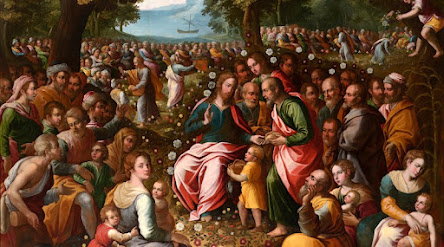“Where can we buy enough food for them to eat?”
He said this to test him,
because he himself knew what he was going to do.
Jesus required his disciples to confront the inadequacy of their own resources. He did not simply make bread appear out of nowhere, as well he might have done. Instead, he made his disciples consider what it would take to get enough for everyone. If we consider what we would need to do even today if we were tasked with feeding five thousand people plus women and children we may have some idea of how the disciples felt. Although they already felt this sense of overwhelm Jesus sent them throughout the crowd to how much everyone's combined resources would be.
“How many loaves do you have?” he asked. “Go and see.” (see Mark 6:38).
No doubt the disciples thought Jesus was hoping to find a practical solution. Maybe if everyone combined what they had it would make some difference. Yet this was not his plan. This was still a part of his test.
One of his disciples,
Andrew, the brother of Simon Peter, said to him,
“There is a boy here who has five barley loaves and two fish;
but what good are these for so many?”
We get the sense that Andrew almost didn't even mention these loaves and fish, since they were so little in the face of such a large crowd. But he did mention them. And that he did seemed to be a sign of faith and a flicker of hope. Yes, he immediately walked back from that faith with negativity. But that did not stop Jesus from responding. He responded both to the meager offering of bread and to the meager offering of faith and hope that, at least for a moment, considered that in Jesus's hands they might be of some good after all. Maybe Andrew knew the story of Elisha multiplying the barley loaves. Maybe he remembered Moses feeding the people in the desert. We should give him credit when these stories didn't obviously leap to mind since Jesus himself seemed to be asking for a practical solution. What must have been his hope, then? That, when Jesus seemed to be asking for a practical solution and there was none possible, he must have had something else in mind, must still have had a plan.
Jesus said, “Have the people recline.”
Now there was a great deal of grass in that place.
So the men reclined, about five thousand in number.
Then Jesus took the loaves, gave thanks,
and distributed them to those who were reclining,
and also as much of the fish as they wanted.
Jesus was the Good Shepherd who made his people recline in green pastures, who prepared a table before his people. Yet this miraculous feeding of the crowds with bread was not his endgame. He refused to be seen as a king who came merely to give the people physical bread to satisfy natural hunger. Rather, this multiplication of the loaves pointed forward to the true bread from heaven which Jesus came to give, the bread of his own flesh for the life of the world. Any physical bread would satisfy hunger only for a time. By the next day the crowd would hunger again. But those who fed on the flesh and blood of Jesus could find in it food that truly satisfied, food in which the soul itself could rest. It was food for the journey, for our own desert pilgrimage through life. When we experience spiritual hunger or weakness this is the place we should turn again and again until the fullness of what we receive, everlasting life, is definitively and finally revealed.
If Jesus was pointing toward the Eucharist it is no wonder that he forced his disciples to come to terms with their own human limitations. As priests of his New Covenant called to feed his people with the Eucharist these human limitations would be even more glaring. Yet Jesus wanted them to rest assured that he could work through their meager offerings. He himself would feed his people through his disciples, hence in John we read "Jesus took the loaves, gave thanks, and distributed them" whereas in the Synoptics we read "the disciples gave them to the people" (see Matthew 14:19). The head would work through his body in such a way that there was no contradiction between these accounts.
Jesus desires for his people to be one flock united under one shepherd, to be a people united around the table of his word and of his body. He does not want us to be scattered to the cities seeking for our deepest needs. Yet to preserve and protect this unity, which is God's own gift, we must be like the disciples, willing to offer what little with have in humility. When we hear negativity and doubt we must respond with patience and gentleness. We must be willing to let Jesus express his own love for our brothers and sisters through us and to willing to receive that same love through them in turn.
I, a prisoner for the Lord,
urge you to live in a manner worthy of the call you have received,
with all humility and gentleness, with patience,
bearing with one another through love,
striving to preserve the unity of the spirit through the bond of peace
We must treasure even the fragments of God's gift, even although our hunger already seems sated, so that nothing may be lost. Just as the Church reserves the remnants of the Eucharist in the tabernacle so too must we reserve the blessings we have been given in our hearts as thanksgiving to God.
The eyes of all look hopefully to you,
and you give them their food in due season;
you open your hand
and satisfy the desire of every living thing.

No comments:
Post a Comment